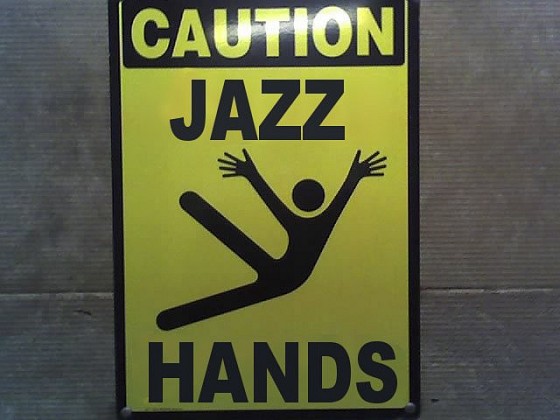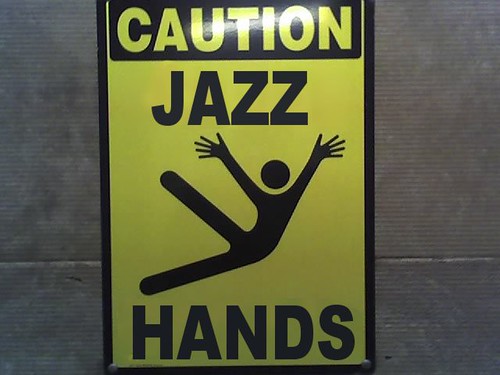If you’ve hung out with me much, at some point I’ve probably busted out one of my favorite phrases: “It’s called show business, not show friends.” It’s a phrase I use a lot when talking to my friends about their careers. I’ve busted it out at parties, in meetings and, on one memorable occasion, talked someone into quitting his job with it (that worked out OK, thank goodness, and I feel relieved that it did rather than MAD WITH POWER).
But What Does it MEAN?
Another saying of mine (this one I got from my mom) is “It’s called work. If it was fun all the time, they wouldn’t have to pay you to do it.” I love my job – LOVE it – but you wouldn’t see me doing it all day every day if I wasn’t getting paid.
It’s Called Show Business, Not Show Friends (or ICSBNSF as I shall now refer to it for brevity’s sake) means keeping in mind that no matter what other reasons someone has chosen their career – because they find it rewarding or challenging or fascinating or just plain fun – it’s still their career, and they should be expected to make decisions that keep that in mind.
Should I Stay or Should I Go
The decision to leave a job is often a difficult one – especially when it’s a job that you’ve liked, where they’ve encouraged you to grow in your skills and where you like your co-workers. When your employer has invested in your professional development, it’s understandable to want to repay that investment by staying on and working hard. It’s easy to feel a bit guilty at the thought of leaving your team or even the whole company scrambling to replace you.
That kind of loyalty is admirable, but it shouldn’t keep you in a job where you’re unhappy or where you’re no longer growing. It shouldn’t keep you from taking a new opportunity that you’re excited about.
The first time I gave notice at a job, my now-husband told me that I should prepare for the possibility that the company wouldn’t want my two weeks; they might just tell me to pack up my desk then and there. That seemed crazy to me, but it is something some businesses do to protect their assets during employee turnover.
It’s important to remember that no matter how much your company may like you, no matter how much they enjoy working with you or appreciate the work you’ve done for them in the past, if they need to they will absolutely lay you off or fire you. If it makes good business sense for you to no longer be employed there, they will absolutely let you go.
When deciding whether to give notice or not, ask yourself: if the situation were reversed, would they be hesitating to fire me?
On Loyalty
Employee turnover is expensive and disruptive, and many businesses do a lot to foster employee retention. This is especially true in the tech startup world, where the hours are long, the skill sets are in demand, and the time frames can be really tight.
Startups often rely on fun offices with things like foosball tables and kegerators; flexible hours and vacation; and lots of extracurricular activities to encourage employee retention. Smart executives also make sure their team members have plenty of room for career growth in their roles and are continuing to grow and learn new skills, to reduce the need for employees to go elsewhere in order to advance.
At a really small scrappy startupy startup, you’re not just working to get paid. You better not be, because the company is struggling to stay alive. The long hours and uncertain future are worth it because you’re working together for a common goal: you’re building a company from the ground up, and you’re all hugely personally invested in it.
The result of all these shoulder-to-shoulder long hours can be a sense of betrayal when a core employee leaves, especially if it’s during a critical phase. More than one startup founder has burned bridges with former employees with a sense of “how could you abandon the business/me.” Owning a business means that nobody will have the same level of investment in your business that you do.
Even when there is a great deal of personal investment on the part of the other members of the company, people’s circumstances change. Sometimes people need to do what’s best for themselves and their careers. It’s unreasonable to expect that people will stay in a job that isn’t the best thing for them just out of loyalty.
This isn’t to say that people should screw their employers over or look out only for Number 1. Loyalty to an employer, especially a good employer, is a great thing. If it’s time to move on from a company that’s been good to you, the best way you can show them how much you appreciate them is to do everything you can to make the transition an easy one. This could include giving a longer notice period or staying on to train a replacement, but might be as simple as providing clear, thorough documentation of your projects and making sure to wrap up everything that you can.
Should I Not Become Friends with My Co-Workers?
Of COURSE you should become friends with your co-workers! Some of my best friends are people I met through work. ICSBNSF in no way means you can’t do business and be friends.
What ICSBNSF does mean is that “friend” doesn’t negate “co-worker.” Be aware of how you treat your co-worker friends in the office. You’re not doing them (or their work) any favors by humoring or indulging them in bad ideas, or in withholding important feedback to spare their feelings, as appropriate. This becomes even more necessary when you are managing or being managed by a friend.
ICSBNSF also means keeping an eye on gossip. Sometimes at work we’re made aware of situations that need to be kept under wraps, whether that’s a change in direction or an interpersonal conflict between two co-workers. When our co-workers are also our friends, it’s tempting to want to fill them in on the whole story, especially if the situation is causing us stress or outrage. Too much gossip can create an atmosphere of unnecessary drama, however, which can make work even less pleasant than the original stressful situation – so know when to keep your mouth shut.
Don’t get all “why didn’t you tell me” when a co-worker friend has been discreet about work-related intel. If they’ve kept information from you that you had no reason to know in your role at work, remember that it’s called show business, not show friends, and your friend is just trying to be appropriate.
Above all do not take it personally or cause a scene when a co-worker friend decides to leave work. They’re not abandoning you; they’re pursuing a new opportunity, and as their friend you should be psyched for them. Saying “I’ll miss you, but congratulations!” is appropriate. Wailing, “What am I going to do without you?” isn’t.
Support your co-worker friends in their next career moves and you’ll not only have great friendships, you’ll also have valuable connections down the line.
TL;DR
“It’s called show business, not show friends” means:
- It’s OK to do what’s best for your career. Loyalty to a company that’s done right by you shouldn’t supersede that (you should still do your best to make any transition out of a job as easy as possible, though).
- We shouldn’t expect our employees to care more about our businesses than they do to their own lives and careers.
- You can be friends with your co-workers, but recognize they need to do their jobs and advance their careers – and sometimes that means leaving.
- When in doubt, ask yourself: “If the situation were reversed, would they fire me?” The answer is almost always yes.




![Beach Foosball [Explored]](https://farm2.staticflickr.com/1054/1366781182_c069707f7d.jpg)

